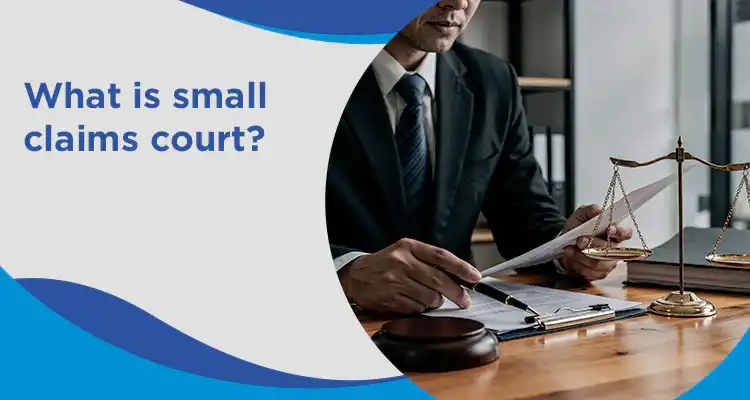File Small Claims Online
What is Small Claims?
Small claims are legal disputes like security deposit disputes, unpaid debts, or property damage, involving relatively small amounts of money, typically handled in a simplified court process known as Small Claims Court.
Generally, there is no official minimum small claim amount to file in small claims court, but the maximum claim limit ranges from $2,500 up to $25,000 you can file in small claims court. Let's discuss how to file a small claims court online.
and how you can win the small claims, but before moving forward, we need to know what the small claims court is and how it works.
What is small claims court?
Small Claims Court is also known as short claims court, a special part of the legal system in the United States designed to help people resolve their disputes quickly and easily. These disputes involve relatively small amounts of money up to $25000. Because small claims limits vary in various small claims courts so it’s important to check the specific rules in your state before filing a small claim.
The small claims court serves for the immediate and cost-effective resolution of claims, and you can file your claims without a small claims lawyer.
In the context of small claims court, both parties, the plaintiff and the defendant, present their respective arguments and evidence directly to a judge. The judge then interprets these submissions into legal terms and issues a decision.

Plaintiff and Defendant in Small Claims
The individual who initiates the small claims case is known as the plaintiff, while the individual who is battered by the claim is referred to as the Small Claims Defendant. These individuals may also be named claimants or parties. Typically, disputes are limited to a financial limit of $5,000, although normal persons (individuals) might be qualified to file claims of up to $10,000.
What types of cases can you file in Small Claims Court?
The types of small claims cases that can be found solutions within the limits of the Small Claims Court are:
- Unpaid debts or loans
- Property damage claims
- Breach of contract disputes
- Landlord-tenant issues (like unpaid rent or security deposit disputes)
- Return of personal property
- Consumer complaints (e.g., faulty goods or services)
- Automobile accidents with minor damage
- Disputes over deposits or payments
- Small business disputes
- Damage caused by pets or animals
Who Can File a Small Claim?
An individual at least 18 years old has the right to file a lawsuit against another individual or a business unit. Likewise, a business entity is allowed to file a lawsuit against either an individual or another business. The individuals or the business that can file the small claims must follow this criterion:
- The individual must be or have reached the legal age of majority.
- The individual must possess mental competence. If an individual is below 18 years old and lacks legal emancipation, or has been formally deemed mentally incapacitated by a court, representation by a legal guardian is obligatory.
- In the case of a minor, typically, one of their parents assumes the role of representative. Guidance on the appointment of a guardian can be sought from a small claims clerk or a small claims adviser.

What are the Statutes of Limitation for Small Claims Filing?
The statutes of limitations carry significant importance prior to initiating a small claims case. The maximum small claims court limits typically range from $2,500 to $25,000, but these limits vary by state. Small Claims Filing fees are typically low and also differ depending on the jurisdiction. Before filing a small claims case in court, please ensure your case qualifies for small claims court and prepare for any associated costs.
For small claims cases, the statute of limitations is liable to both the state and the type of claim. For example, in California, the statute of limitations for a Small Claims Case is fixed in a written contract times two years, whereas in New York, it spreads to six years. It is a must to follow the relevant statute of limitations relevant to your specific case before starting with a claim, as filing a claim after the statute of limitations has expired could lead to the cancellation of the case. All in all, understanding the applicable statute of limitations for your small claims case holds essential significance in assuring that your case receives recognition within the legal framework and that you preserve a solid legal stance.
How to file a Small Claim?
There is are series of fundamental steps before you file small claims online. Here is a step-by-step small claims court procedure to file your case in the right way:
Step 1: Identify the Correct Defendants
It's paramount to identify and initiate legal action against the accurate "defendant" (the individual or entity you believe owes you money). Multiple defendants can be sued for the same incident or contract, but each defendant must have a genuine interest in the subject matter and a potential link to your injury. In cases of contract breaches, the defendant is typically the person or business you contracted with. For personal injury or property damage cases, the defendant is usually the entity directly responsible for the harm.
Step 2: Determine the Exact Amount of Your Small Claim
Within small claims court, the financial claim is limited to a small claims maximum amount of $10,000. Indeed, starting the sum you plan to recover is important. While this may seem straightforward, it can be complex in some cases. For example, if your claim is based on repair costs, multiple analyses should be obtained to guide the judge's decision. In cases involving additional costs, the judge may consider the current value of the lost or damaged thing rather than the cost of replacement.
Step 3: Send a Demand Letter
Before proceeding to sue, small claims court guidelines typically require you to request payment from the opposite party. This involves sending a certified letter demanding payment. Duplicates of this Demand Letter, certified mail receipts, and return receipt postcards should be reserved for future reference and filing.

Step 4: Decide Where to File Your Case
Choosing the appropriate court for your case is important as different courts may have specific forms and methods. Submitting your case in the right jurisdiction is important to escape cancelation of the case. You generally need to file in the justice court serving the address where the defendant lives, works, does occupational, or where the incident happened.
Step 5: Prepare Your Small Claims Affidavit of Complaint
The Small Claims Affidavit, or petition, starts the case and highlights the main factors such as the petitioner, defendant, the amount claimed, and the reason for lawsuit.
Step 6: File Your Complaint with the Court
The Small Claims petition can be submitted to the court after a required waiting period of fifteen days from the demand letter.
Step 7: Serve the Defendant with the Summons and Complaint
Sending the defendant with the summons and complaint is a must for case proceeding. This can be done through certified mail, personal service, or using a process server.
Step 8: Attend the Hearing
Upon successful service of the defendant, a hearing date is planned. Through this hearing, you present your case and supporting proofs.
Step 9: Receive the Court's Decision
Following the hearing, the judge reviews the evidence and delivers a ruling.
Step 10: Collect the Judgment
If your case is successful, you must receive the judgment. This could involve steps such as garnishing salaries, placing liens on property, or other legal actions.
How much does it cost to file a small claim?
The cost to file small claims court can show significant variations depending on the state and jurisdiction involved. If you are ready to file small claims online, it's crucial to consult your local court for precise information about the fees tied to your specific case. Below is a general overview of common fees commonly encountered in United States small claims courts:
- Small claims court fees: Small claims fees are required when the plaintiff starts a claim with the court. The amount varies broadly, small claims court charges starting from approximately $15 to over $200, depending on the state and the claim amount.
- Service Fee: A fee is needed to send documents to the defendant. The cost to file small claims court starts from about $20 to $100, determined by the type of service required.
- Mediation Fee: Some courts offer mediation as an alternative to trial. If parties opt for mediation, a fee might be associated with this service.
- Transcript Fee: Acquiring a transcript of the court hearing could incur a fee if desired by a party.
- Appeal Fee: Should a party choose to challenge a decision from the small claims court, an extra fee might apply in conjunction with the appeals process.
Engaging with your local court will provide precise insights into the costs relevant to your case.

What are the Rules/Tips to effectively represent yourself at the Small Claims Court?
Participating in your hearing or trial undoubtedly ranks among the most crucial and anxiety-inducing phases of your case. Yet, equally significant is the substantial groundwork that precedes the trial. In fact, the majority of cases hinge on the preparation carried out well before the courtroom proceedings commence. Commence your planning for the hearing or trial right from the outset of your case.
- Familiarize yourself with applicable laws and rules:
Master the laws and regulations pertinent to your case. Understanding your legal context is essential before making any decisions.
- Don't Surrender Without understanding ing the Implications:
Resist the urge to give up without comprehending the potential ramifications. Fully grasp the consequences before making any decisions.
- Maintain Comprehensive and Timely Written Submissions:
Ensure that all written documents you submit are thorough, orderly, and submitted on time. Neatness and punctuality can significantly impact your presentation.
- Attend Hearings and Arrive Early:
Attend all scheduled hearings, reach at the courthouse on time. Punctuality describes your assurance and respect for the case proceedings.
- Organize Your Files:
Bring your case files to court, organized in a coherent manner. This allows you to access relevant information swiftly during the proceedings.
- Present Evidence and Witnesses:
Have your evidence and witnesses prepared for presentation. Well-prepared evidence and credible witnesses can bolster your case.
- Comprehend the Proceedings:
At all times, struggle to understand the steps related to the case proceedings. This understanding will permit you to make knowledgeable decisions and replies.
By following this guidance, you can increase your capability to present your case successfully and navigate the difficulties of the legal process.
Why Use Our Small Claims Filing Service?
Filing a small claim can be confusing and time-consuming, especially if you’re not familiar with the court process. Our Small Claims Filing Service is here to make it simple and hassle-free.
Benefits of Using Our Service
Convenience: We handle all the small claims court paperwork and small claim court filings for you, so you don’t have to worry about complicated small claims forms or deadlines.
Expert Help: Our filing team understands the specific requirements of each state’s small claims court and ensures your small claim is filed correctly with the right forms the first time.
Save Time: Skip long waits and trips to the courthouse. We prepare you forms and help you file your small claim quickly and efficiently, letting you focus on what matters most.
Avoid Mistakes: Errors in small claims filing can delay your case or even cause it to be dismissed. Our experts carefully review your documents to prevent costly mistakes.





 Get fast resolution by filing your small claims in the court.
Get fast resolution by filing your small claims in the court.




